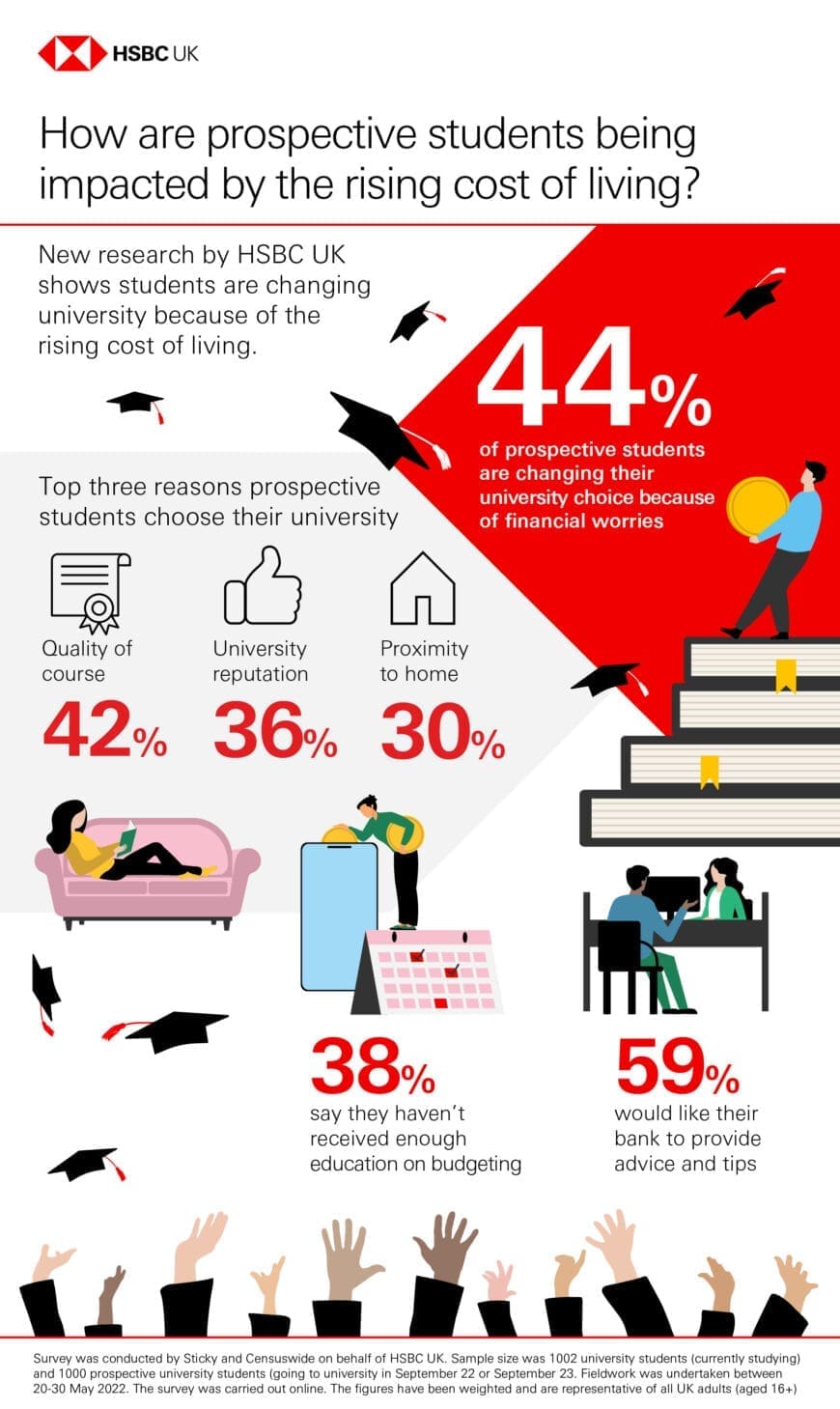Budgeting Tips for University Students is a paid collaborative post with HSBC who have just completed new research with students that have shown that over half of all British students say financial concerns are having a negative impact on their mental health and 45% have switched choice of university because of worries about the cost of living. As a parent of a soon-to-be University student, I find this really concerning, but more so the fact that nearly half (46%) the student population say they don’t feel they’ve had enough education on how to budget.

As a parent, I have made it one of my tasks to raise money-savvy children, however, money management and budgeting aren’t specifically taught in school or college and this leaves a big gap in life skills for a lot of people. The cost of living increases are a concern to everyone at the moment and student money worries are a real concern, especially for students who are working on a budget and using student loans to live on, often without parental backup for the first time. So we have gathered together some brilliant budgeting tips for university students.

Getting student loans and funding at the start of each term means that it can seem that you are really flush with money, however, you need to remember this has to last you until next term or even longer.
Money Management Tips for Students
Make sure you check out our Printable Ultimate University Packing List so you only buy what you need first!

Create your budget – In order to manage your money, you need to know exactly what income you have coming in (student loan, part-time job wages, parental support, savings, bursaries, sponsorships or scholarships you’re eligible for) and what expenses you have going out (including tuition fees, accommodation rent, household bills, such as gas and electricity, water and broadband, transport costs, food, school supplies and course materials). You then need to give yourself an amount to spend each week or month.
Watch out for the pennies – The odd 50p here and there can really soon start to add up, so make sure you don’t get caught out with cash machines that charge for withdrawing money on campus and find a local free one instead. The same applies to lunch, a meal deal can seem like a good deal but £3.50 each lunchtime soon adds up – you can save so much by preparing your own lunches and buying drinks and snacks in bulk. These sports of spending habits will stand you in good stead over tour life and starting as you mean to go on really helps. You learn fast that convenience costs and that groceries on campus will be more expensive than at the supermarket.
Can I get it Free or Discounted – Make the most of any student discounts or freebies you are eligible for. A Totum card (formally known as an NUS card) is worth getting, not only do you get 10% off purchases at the co-ord, but it has loads of other discounts. It costs £14.99 for a one-year card, or £24.99 for a two-year or three-year card, including a free Tastecard (which gives you even more discounts at thousands of restaurant chains and attractions) and free proof of age Student ID card (PASS-approved). Student houses do not need to pay Council Tax, as long as the only people who live there are full-time university or college students
Right now you can get Amazon Prime Student free for six months! That gives you unlimited free next-day deliveries (+ Prime Video). Then you get Prime for just £4.49/month or £47.49/year (that is a 50% saving on regular Prime).
Transportation – If you are going to spend more than £90 a year on train journeys, you should consider getting a 16-25 Railcard, which cuts a third off off-peak train tickets and tube fares. If you need to travel from your accommodation to your lessons then it might worth out cheaper to buy a bike (if you are going to regularly use it) rather than rely on public transport. When it comes to buses, see if you can get a discount.

Do not Impulse Buy – It can be easy to fall for temptation and buy things you don’t need, but want at that particular time. A great way to make sure you only spend what you have is to use budgeting envelopes.
Track your spending – Yes, you have a monthly budget, but you are in a new environment and you need to track your spending and actual transactions and make sure that your budget remains accurate and make any adjustments. Your bank or credit card is likely to have an app with a budget feature. Alternatively, you can use a budgeting app like Mint, which integrates all your accounts to help you track your spending and create a budget.
Textbooks – Rent, borrow or buy preloved. At the start of a new term, it’s likely you’ll be given a list of books you’ll need over the year. Some textbooks can be really expensive and even though they will be in the uni library you can guarantee they will be already out when you need them. So check out buying second-hand from Amazon, eBay or even notice boards around collage or charity shops. An economical alternative is renting from sites like VitalSource that loan you an electronic version of textbooks for up to a year, for up to 80% less than buying new.
Plan ahead – Book your travel around 12 weeks ahead of time for the best deals. Meal planning and learning to cook can save you so much on food. When it comes to food, look at using budget supermarkets such as Aldi, find out when local shops reduce food, club together to buy with housemates and NEVER shop when you are hungry!
Shop Around – Make sure you get the best deal for what you are buying and then always follow out five tips to save money – cashback, voucher code, price tracking, price matching and vouchers.
If you really can not cut down on your spending then why not look for a job that will fit in with your studies? Did you know that with a TEFL course, you can earn via teaching English as a foreign language online parttime?

Pingback: Ultimate University Packing List with Free Printable - Mum In The Madhouse
Pingback: How to Save Money on Groceries and Food Shopping - Mum In The Madhouse
Pingback: Insurance - Is it Worth It? - Mum In The Madhouse